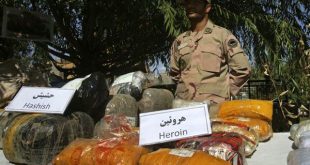
One of the most essential issues is narcotics trafficking comprising transit, cultivation in Pakistan; since it becomes a source of income for hard-line groups. It turns out to be one of the most vital parts of the financial sector in Pakistan; it is approximately billion dollars, being equivalent to several times as much as the country’s foreign debts. The mafia’s groups’ financial resources have brought them into the realm of political, economic, and educational interactions, pursuing their goals, so it causes them to penetrate into various social, economic, and political layers. Thus, implementation or ratification of any plans, bills or laws would be stopped since it jeopardizes these groups’ interests.
Apart from the central and southern regions, the mafia’s penetration has been boosted in northern and western regions, through investments as well as young human resources employment, where the government’s influence is negligible, so causing it more difficult to confront them.
Based on the 2016 report, the International Bureau of Narcotics and Law Enforcement Affairs, more than 40% of Afghanistan’s drugs will pave their way to the world through Pakistan. Pakistan as a transit route for precursors of heroin and methamphetamine is playing an active role.
In 2015, Pakistan launched a series of anti-narcotics awareness; Counter-Narcotics Authority of Pakistan along with the US Counter-Narcotics office arrested 90 major drug traffickers. According to Pakistan Drug Enforcement Bureau’s report in 2015, it discovered about 1216 tons of heroin, 5015 tons of opium, 30 kg of Cocaine, 13364 kg of Hashish. The figures illustrate a 30 percent increase in comparison to the same period in the past. Overall, limited budget and immediate threats to national security stopped the government not to pay sufficient attention to the sector, controlling corruption in administrative, political, and economic sectors.
In 2017, the Ministry of Counter Narcotics was established in 2006 as an independent entity in the Pakistan Cabinet for the supervision of anti-narcotics (ANF), aiming at enhancing observing and controlling it.
The Pakistan government has officially announced its plan to boost resources and budget of the Afghan police institute in 2018, therefore it is predicted that it launches the Baluchistan Regional Office to heighten the control capacity of the province.
In 2017, the ANF was responsible for the 10th drug task force where Pakistani institutes came together to coordinate activities and promote mutual collaboration on drug control in the 27th round of talks. The organization budget was 202 million in 2017, it reached 216 million $ in 2018 that would not suffice for the mentioned aims and targets to be reached due to the fact that the amount of budget will be spent on the employees’ salaries, purchase of equipment, maintenance of vehicles. Almost more than 65% of the annual budget has been spent on salary payment of 3100 employees in more than 40 regional offices, also the ones throughout Pakistan (except tribal areas).
Given the projects, it has signed under the treaty of Paris and the rest, the organization is responsible for training 1000 interns in 2017, though no data have been released on their level of success.
It is noteworthy that the “Pakistan Customs Administration” is the only federal law enforcement agency for routine drug control operations in any provinces comprising tribal areas. According to the reports, the most essential issue is legal deficiencies (law) in this respect that Pakistan cannot do legal and operational changes, also there is no serious agreement between the US and Pakistan as Islamabad’s most vital anti-narcotics ally to attract legal aids. One of the most pressing issues facing the Pakistan government is tacking the spread of drug consumption, transit, and cultivation.
Parliamentary observing committees, the judiciary, the press all are in the chain of corruption. The corruption has facilitated the bribery from the employees to the rest. It is an undeniable part of the system.
Short-term conviction of the drug traffickers can be one of the challenges facing drug trafficking, several employees have been retired sooner due to their briberies related documents and alike.
 Cudras
Cudras





